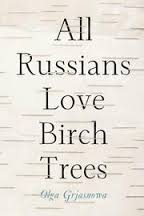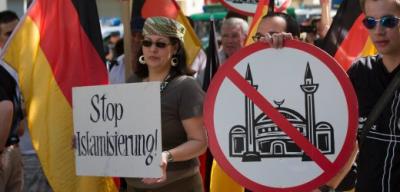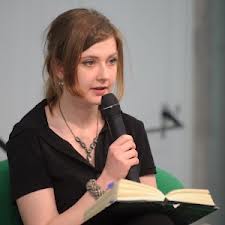A landlocked region of 1,700 square miles in the Caucasus, Nagorno-Karabahk declared itself an independent republic in 1991 when the Soviet Union crumbled. The territory lies inside Azerbaijan but its population is dominated by ethnic Armenians. Since the late 1980’s, skirmishes between Azeris and Armenians have killed over 30,000 people; over one million have fled or emigrated. Armenia has occupied sections of western Azerbaijan. An all-out war could draw in other border states such as Turkey and Iran.
 This conflict simmers at the core of All Russians Love Birch Trees, Olga Grjasnowa’s first novel, translated from the German by Eva Bacon. The story is narrated by Masha Kogan who, like the author, is from a Jewish family that escaped from an Azeri pogrom and moved to Frankfurt when she was a few years old. Insisting that the novel is not autobiographical, Grjasnowa asks us to regard it as a “political book.” But it is hardly polemical. Her true subject is the displacement, disordered identities, and daily struggles of a generation of aspiring young people, born mainly in the Middle East and now in their thirties, who are oppressed existentially by politics, bias, and long grudges.
This conflict simmers at the core of All Russians Love Birch Trees, Olga Grjasnowa’s first novel, translated from the German by Eva Bacon. The story is narrated by Masha Kogan who, like the author, is from a Jewish family that escaped from an Azeri pogrom and moved to Frankfurt when she was a few years old. Insisting that the novel is not autobiographical, Grjasnowa asks us to regard it as a “political book.” But it is hardly polemical. Her true subject is the displacement, disordered identities, and daily struggles of a generation of aspiring young people, born mainly in the Middle East and now in their thirties, who are oppressed existentially by politics, bias, and long grudges.
 To begin, Grjasnowa’s main cast includes most of the ethnicities that will figure in her story. Elias is Masha’s German boyfriend. A former boyfriend, Sami, was born in Beirut during the civil war from a Swiss father and Arab mother. A friend named Cem was born in Frankfurt from a Turkish family. While pursuing advanced degrees, the friends take jobs; Masha and Cem are translators (she is proficient in French, German, Arabic, and Russian). After Elias suffers a serious injury and Masha takes a job with a German NGO in Israel, Grjasnowa introduces Ori and Tal, brother and sister, he a member of the IDF, she a left-wing activist.
To begin, Grjasnowa’s main cast includes most of the ethnicities that will figure in her story. Elias is Masha’s German boyfriend. A former boyfriend, Sami, was born in Beirut during the civil war from a Swiss father and Arab mother. A friend named Cem was born in Frankfurt from a Turkish family. While pursuing advanced degrees, the friends take jobs; Masha and Cem are translators (she is proficient in French, German, Arabic, and Russian). After Elias suffers a serious injury and Masha takes a job with a German NGO in Israel, Grjasnowa introduces Ori and Tal, brother and sister, he a member of the IDF, she a left-wing activist.
In Baku, Masha had witnessed a gruesome death, the proximate cause of her post-traumatic stress. Grjasnowa understands that a certain flatness of tone allows her to create a tense face-off between events and her narrator who plunges through her own narrative. Masha’s life is writ small in a massive, turbulent world. She is bisexual. She is a Jew, gone to work in Israel, who doesn’t speak Hebrew and asks for the Arabic menu in Tel Aviv restaurants. And like her friends in all cultures, she wants simply to live in peace and safety. “What I want,” Masha says, “is running water, electricity, and a place where no one is killed.” Nevertheless, Masha’s relationships are marked by contentiousness, sexual tension, repulsion, and longing.
In structure, content, and ambition, All Russians Love Birch Trees is rather conventional and leans heavily on the vocabulary and verve of youth. There comes a moment when one asks why Masha is telling this story at all. But reticence is Grjasnowa’s friend. There comes another moment when one realizes that Masha treats her listener as an intimate – someone who will not demand more than she can give and yet who is willing to be present. The reader develops an ear, the wary attention of the displaced.
 All Russians Love Birch Trees embodies Masha’s slow progression of awareness of just how disturbed she is. At mid-book, she can say about Elias and her memory of horror, “He thought I didn’t trust him, but I was simply of the opinion that what had happened was of no importance to us. I didn’t want genocide to be the key to my personality. I’d read about people with posttraumatic stress disorders – not that I would ever classify myself as such – that we destroy the people we love. And Elisha was a casualty of that.”
All Russians Love Birch Trees embodies Masha’s slow progression of awareness of just how disturbed she is. At mid-book, she can say about Elias and her memory of horror, “He thought I didn’t trust him, but I was simply of the opinion that what had happened was of no importance to us. I didn’t want genocide to be the key to my personality. I’d read about people with posttraumatic stress disorders – not that I would ever classify myself as such – that we destroy the people we love. And Elisha was a casualty of that.”
The book’s second half exploits Grjasnowa’s gut feelings and impressions of Israel. Boldly lifting Masha out of Frankfurt and placing her alone in Tel Aviv, Grjasnowa enhances the drift and dread of Masha’s circumstances while sketching security checkpoints, bars, beaches and streets with brilliant strokes. Below, Masha recalls a moment in Palestine while on assignment with a Palestinian guide:
The wall across from the restaurant was full of graffiti. Somebody had written in green ”Allahu Akbar,” and another one “Sister, fear Allah – don’t take off your hijab.” Next to that in unsteady handwriting, “Fuck Israel” and “Fuck PA, Fuck Hamas.” Farther down someone had added with a Sharpie, “Fuck me, if you want.”
Ismael followed my gaze and pointed toward the house in front of us. “Do you see the water tanks on the houses?” I nodded. “Israel fills them twice a week. And that’s it. If you use up the water too quickly, that’s your problem. No one will help you.” Ismael looked at me. “I hope that’s not too much for you to take in?”
“We didn’t have water either.” “What?” “In Baku we had a maximum of one hour of water per day, and not even regularly. In that hour you’d fill everything with water: tanks, tubs, bottles.” “OK, you win.”
A swastika was etched into our table. I traced the lines with my fingers.”
The monotonous grip of depressive spirit is not an easy condition to represent in the first-person. Masha suffers a series of micro-setbacks and more dramatic collapses, but Grjasnowa has no option but to state them as fact, minimizing the verbal effect of what is maximally felt in the character. Some have complained that the novel’s circumstances are more artfully rendered than the psyche propelling the narrative. I regard Grjasnowa’s tonal limitations as credible though she risks a bland repetitiveness in the phrasing of Masha’s anxiety.
 Masha has an acute talent for detecting nuances in languages – but fluency and verbal dexterity are overshadowed by the rooted hatreds in the world of All Russians Love Birch Trees. What capabilities will allow us to survive the present and disempower the past? Grjasnowa has managed to pack a great deal of this dissatisfying and potentially lethal world in her novel while generating in this reader the queasy disquiet that plagues a generation.
Masha has an acute talent for detecting nuances in languages – but fluency and verbal dexterity are overshadowed by the rooted hatreds in the world of All Russians Love Birch Trees. What capabilities will allow us to survive the present and disempower the past? Grjasnowa has managed to pack a great deal of this dissatisfying and potentially lethal world in her novel while generating in this reader the queasy disquiet that plagues a generation.
[Published by Other Press on January 7, 2014. 324 pages, original paperback. Published in Germany in 2012.]